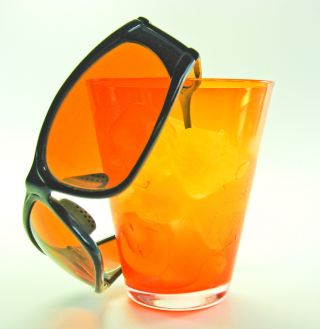
Sleep
The Blue Light Special
Should I wear orange glasses at work and at night?
Posted April 16, 2015
The Light Drug

Light is a potent drug. It resets internal biological clocks. It increases alertness and productivity. It changes natural killer cell activity and immunity. It can keep us awake or help us rest.
But first we have to recognize that not all light is created equal. Which is why some people are trying to make you see the world through orange colored glasses.
Blue Versus All the Rest
Blue light is particularly good at shifting biological clocks. It is generally more proficient than green or red.
But nothing beats sunlight—so called white light—in affecting our lives through our normal days.
Many electronic devices use proportionately high levels of blue within their lights. This makes sense. They want to keep us up and awake—so we can watch TV, play games and buy more products.
Yet blue light at night is particularly potent in arousing teenagers from what might be necessary slumber. Adolescents appear to be more sensitive to blue light than old folks like myself—perhaps by a measure of magnitude.
So the blue lights of cellphones and TVs do more than knock off melatonin production—the hormone of darkness. They wake people up –especially when they beep in the night. They also shift internal clocks later. That makes us want to go to bed later—and get up later and later.
Getting up early for work or school is harder with nighttime blue light exposure, the kind we get from electronic devices. That’s why researchers are interested in orange glasses.
The Orange Advantage
No, Dutch or Texas football fans (both kinds of football,) this is not an encomium to your teams. Orange jerseys and Tshirts won’t block out blue light—but orange glasses can. In several studies teenagers who watch monitors for hours and hours become sleepier when they wear orange “sun” glasses.
Right now numerous blue filters are being hawked for your cellphone and computer monitors. They may provide a little help in letting you get to sleep.
Except cellphones and computer monitors do more than pump out blue light. They are alerting devices unto themselves – connecting us physical, mentally and socially with others.
Which is why it makes a lot of sense to turn them off for at least an hour before we go to sleep. That way we can use rest for what it’s for—regenerating and renewing our bodies.
How to Use Light To Sleep
Your inner biological clocks time life. And time rules life. Before electric lights were manufactured, most people went to bed and awoke guided principally by the rhythms of the sun and moon.
Our bodies are still built that way. Biological evolution is slower than technological evolution. In many ways, humans still have not adjusted to electric lights.
So are we fully adapted to the internet? No. Which means we have to find other adaptations that allow us to work in an artificial environment whose rules are very different from the ones built into our bodies.
Here are a few that can work:
First – get sunlight in the morning.
Morning light makes it easier for us to wake up.
Morning light—when regular—improves mood.
Morning light—when provided at consistent times—helps us sleep that night.
Morning light—plus exercise—is yet better in helping us sleep that night.
The evening story is more or less the reverse.
To sleep well at night, you minimize evening light.
How?
Turn the house lights down in the evening (parties do not count.)
Stop using cellphones, TVs and monitors an hour before sleep.
Next, in low light, create your own sleep ritual. You can: turn down the bed, put out your clothes for the next day, floss and brush your teeth, spend a few moments doing yoga or meditating or devising the dreams you want that night. Then you might read a sleep aiding book (many options here) or listen to music that helps you sleep (if you have yet to sample 14th-17th century music, this is your chance.)
What does all this do? It allows us to use light the way we evolved to use it—alerting us in the morning and with its absence helping us rest at night.
You can use orange glasses in the evening if you wish. It’s easier and more effective to see what your body’s built to do—and rebuild it doing what you are meant to do:
Regenerating yourself through rest.



